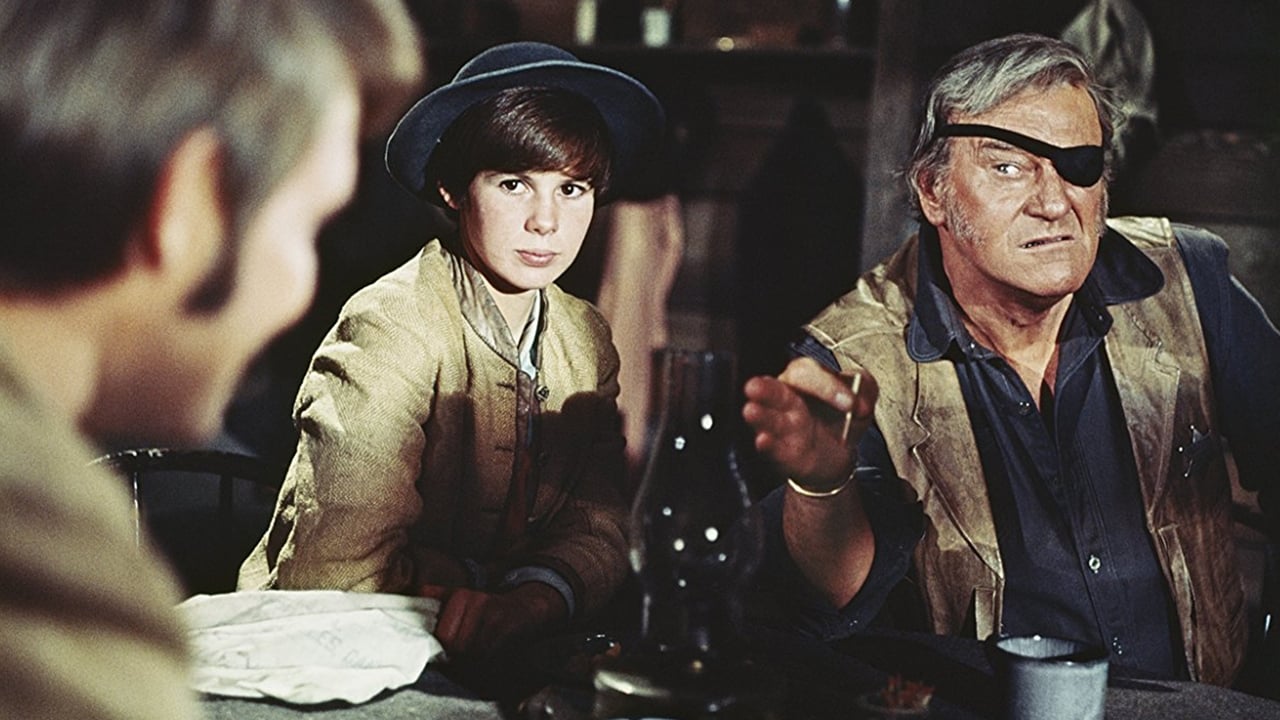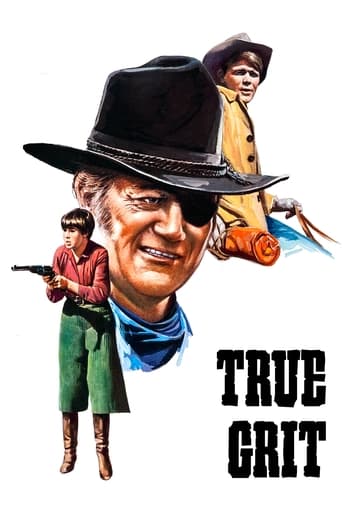



Charming and brutal
A different way of telling a story
Not sure how, but this is easily one of the best movies all summer. Multiple levels of funny, never takes itself seriously, super colorful, and creative.
View MoreOne of the best movies of the year! Incredible from the beginning to the end.
View MoreJohn Wayne's bulldozing performance as eye patch-wearing Marshall Reuben J. Cogburn (a.k.a. "Rooster") is the centerpiece of the old-fashioned western "True Grit"; without Wayne, it would have been utterly unremarkable. Based on Charles Portis' novel, story involves the crusty Marshall being hired by a feisty juvenile to track down the band of killers responsible for her father's death. Though the movie is spirited and fairly enjoyable, and the Duke does some fun overplaying, the script is thin and director Henry Hathaway goes heavy on the corn. As the impertinent Mattie Ross, Kim Darby's impatient manner and bossy voice are fun qualities at first, but there's too much of her (there's also too much of Glen Campbell and Jeff Corey in support). Wayne's Oscar win for Best Actor was seen as a sentimental pick in 1970, and time has done little to change that perception. He reprised his role for the 1975 sequel, "Rooster Cogburn". Warren Oates took the lead in a later TV series. **1/2 from ****
View More" . . . child," Tom Chaney (a.k.a., Theron Chelmsford) laments, to no one in particular, in one of this movie's funnier scenes. TRUE GRIT has a lot more action than THE REVENANT, though not quite as much as THE HATEFUL EIGHT, this past year's leading Westerns. While TRUE GRIT is a revenge tale like the former flick, the percentage of its characters who croak before the final curtain drops is less than what was the case in the latter film. Robert Duvall looks about as bald and elderly here in the mid-1900s as he has in the movies that he's made in this century. Glen Campbell may sing the title song for TRUE GRIT, but his acting chops as "Le Boeuf" pale in comparison to Ricky Nelson, Dean Martin, Fabian, and all the other stunt-cast singers co-starring in the Westerns turned out around this time by the Batjac Bunch. Dennis Hopper fingers a few chords from Quentin Tarantino's songbook during his TRUE GRIT cameo, but it is Kim Darby as "Mattie Ross" who truly pulls this story off, with her Little Miss Firecracker blend of foolhardy waif and feisty spitfire. If the Army Rangers were allowed to recruit and train chicks like her in 1969--as they can today--the Vietnam outcome may have been different.
View MoreJust watched it on TV for about the eighth time. The film is a masterpiece. Just as was the novel on which it is based, written in the language of the story's historical context in a quite extraordinary way. John Wayne's and Kim Darby's performances are faultless, and the Texas Ranger is not bad either. And what about the music by Elmer Bernstein? Just looked him up to find - not surprisingly - that he was a pupil of Aaron Copland. What had struck me before were the unexpected echoes of Bartok, which fit with the action quite brilliantly.I don't know whether the film stock has been re-jigged in some way since the film was first made, or whether I now have a better television, but the quality comes up lovely. When the modern remake by the Coen brothers came out it got a lot of praise for greater authentic atmosphere and truth to the novel. Not by me. Give me a hero who doesn't mumble, for starters. And the compressed ending of the 1969 film is better than the long-winded one of the novel. The new film has its merits, certainly, but it does not replace the Wayne/Darby mini-epic.
View MoreI never liked John Wayne as a kid and never much liked westerns. This movie didn't turn me around but let's say that it made me stop and change my mind for 128 minutes. I saw it on TV in Spain a couple years go (Valor del Ley is the Spanish title) and I was struck by the majestic beauty of the locations. I also went back and reread the fantastic book upon which the film is based and from which comes every great word of dialogue.The book is narrated in the no-nonsense, straightforward fashion you would expect from a good journalist, as Portis was before he gave it up to write fiction full-time. He has a great ear for dialogue and he obviously researched the speech of the era as there are many phrases and words that are now out of use or just impossible to invent. Folks just plain spoke different back then, something Portis was keen on having us hear. Take this little exchange:"I don't believe you have fifty dollars, baby sister, but if you are hungry I will give you supper and we will talk it over and make medicine. How does that suit you?"I said it suited me right down to the ground.I just don't think you could make up a line like "right down to the ground." That Portis was a newspaper reporter shows in his attention to details like this small one (but all details, big and small, are important, of course). I suppose that I take more notice to Portis' ventures in language because I am up to my own eyebrows learning Spanish and I subconsciously am translating everything I hear and read into castellano, as it is called here, mostly. And evidently Portis was a bigger fan of the Duke than I because he wrote the character of Rooster Cogburn with him in mind. The author also had a fair ear for humor of which the novel and both movies abound.I found myself one pretty spring day in Las Vegas, New Mexico, in need of a road stake and I robbed one of them little high-interest banks there. Thought I was doing a good service. You can't rob a thief, can you? I never robbed no citizens. I never taken a man's watch." "It is all stealing," said I."That was the position they taken in New Mexico."At least both sets of film makers have enough wisdom to recognize the wisdom in the book.The original movie certainly isn't perfect, not by a long shot. But any criticism of it would be like criticizing the way people talked back in the 1880's. Films are different today, mostly better in my opinion. There are some problems in the 1969 version with some of the side characters and bad acting. The musical score is sometimes bombastic and annoying. The first five minutes which recount the murder of Mattie's father are tiresome and have been wisely excluded in the Coen brothers' remake. More than anything the 1969 movie is absolutely gorgeous from start to finish. The old movie has a better and more satisfying ending than the new one which follows the book more closely. The old movie is pure Hollywood, not always a pejorative, especially in this case."You're too old and too fat to be jumping horses." "Well come and see a fat old man sometime."
View More